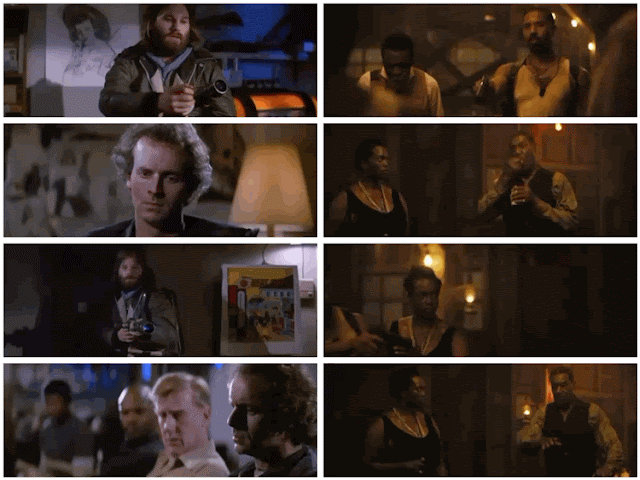I say all this because even though Sinners falls somewhere between Good/fine/entertaining (I personally found everything non-vampire related to be the most interesting), it still has the stench of "Get Out-sploitation". On one hand, it isn’t Ryan Coogler’s fault that everyone’s critique of this film is some insufferable super personalized think piece about race or the role of Black people in society or the so-called dangers of interracial relationships between Black men & White women (it's always only Black men and white women and never a critique on any other type of interracial relationship). It’s par for the course. Folks put a lot of weight on movies & television shows. For some reason a large sector of Black folks would rather seek validation about their Blackness from a movie or a TV show instead of real life. But at the same time – Coogler has to know that a movie with a predominately Black cast set in 1930’s Mississippi where a group of white vampires terrorize a Black establishment is going to bring on this type of dialogue. Outside of the basic premise which lies somewhere between Night Of The Living Dead and The Thing from Another World, Sinners has all the standard elements & themes I brought up earlier like; “beware of the white boogeyman” and “watch out for those white women”.
Outside of the basic story about a group of characters trying to survive a vampire coup, Coogler made a genuine effort to touch on everything from the great migration to the history of Black Americans and their African roots. I don’t think everything was a success but I’m still glad I watched it on the big screen. Streaming Sinners at home won’t give you the same experience. I found some of the character’s decisions in the second half of the movie to be very stupid but I’ll give Ryan Coogler the benefit of the doubt on that. Perhaps he wanted to bring back that old school feeling of shouting at the screen when someone makes a stupid decision in a horror movie. I certainly found myself talking to the screen when someone does something dumb. This is clearly a movie that’s more than just a simple vampire movie so there is room for a deeper analysis. But reading through a lot of people’s tweets, tiktoks, letterboxd reviews and social media rants exposed that some folks needs to touch grass, go to therapy or do a combination of both. Good lord. You could argue that I'm giving too much attention to the opinions of people online. But if you think these aren't real life opinions then you're being naive....
And if you don’t want to go to therapy – watch more movies.
I’m happy that a filmmaker like Ryan Coogler remains successful but if there’s one thing that Sinners exposed it's that people need to watch more movies. You would have thought this was the first vampire movie ever. And if not Sinners, you would have thought that From Dusk Till Dawn was the first vampire movie to do what it did (…it wasn’t). For those that don't know, many people are saying that Sinners “stole” from From Dusk Till Dawn.
I’m happy that a filmmaker like Ryan Coogler remains successful but if there’s one thing that Sinners exposed it's that people need to watch more movies. You would have thought this was the first vampire movie ever. And if not Sinners, you would have thought that From Dusk Till Dawn was the first vampire movie to do what it did (…it wasn’t). For those that don't know, many people are saying that Sinners “stole” from From Dusk Till Dawn.
To that claim I will reemphasize that people need to watch more movies. From Dusk Till Dawn is a collage movie much like Pulp Fiction. It’s an homage to a handful of pre-existing genres. Last time I checked, the basic premise of Sinners is very similar to Ernest Dickerson’s Demon Knight (a movie released a year before From Dusk Till Dawn), which got it’s basic premise from George Romero’s Night Of The Living Dead (Dickerson worked under and learned from Romero before he became a director himself). Again – watch more movies before you decide to step out there and be loud & wrong.@thestorytimeguy I love the movie Sinners but... its From Dusk Till Dawn #Sinners #fromdusktilldawn #vampires ♬ original sound - Matthew Torres
 |
| Night Of The Living Dead / Sinners |
 |
| Night Of The Living Dead / Sinners |
 |
| Demon Knight / Sinners |
Outside of Night Of The Living Dead by way of Demon Knight, Sinners also borrows from typical sources like The Shining
 |
| The Shining / Sinners |
And John Carpenter...
it's actually quite close to THE FACULTY, which is a remake of THE THING, which is one of my favorite movies. Definitely my favorite horror movie. So there's a lot of Carpenter in the film as well - Ryan Coogler
 |
| The Thing / Sinners |
 |
| The Thing / Sinners |
During Coogler's recent visit to the criterion closet he also namedropped Michael Mann's Thief as a another source of inspiration. Without spoiling too much - the endings to both films are pretty similar...
 |
| Thief / Sinners |











.gif)

.gif)
















